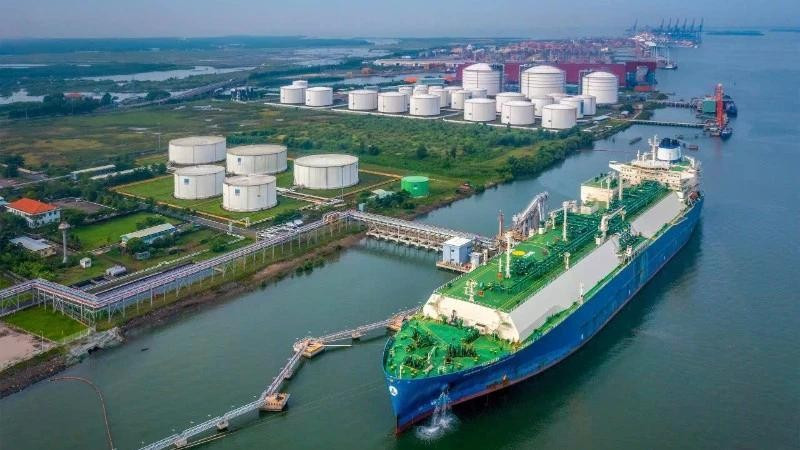Leading and pioneering role of state-owned enterprises promoted
In the new era, comprehensive, holistic, and breakthrough solutions are required for state-owned enterprises (SOEs) to advance steadily on the path to development, continue to play a leading and pioneering role, and contribute to realising the goal of rapid and sustainable national growth.

On 5 June, the Government Office issued Official Dispatch No. 4941/VPCP-ĐMDN, conveying the prime minister’s instruction to the Ministry of Finance to take the lead, coordinate to finalise the proposal, and recommend a new Politburo resolution on the development of state-owned enterprises. This move aims to genuinely stimulate and harness SOEs as a vital material force, carry out the leading role of the state economy, and contribute to national development in the new era.
Unblocking key impediments
After nearly eight years of implementing Resolution No. 12‑NQ/TW of the 5th Plenum of the 12th Party Central Committee on restructuring, reforming, and enhancing the efficiency of SOEs, this sector has experienced strong development, increasingly meeting the country’s development and economic integration needs. According to the Ministry of Finance, as of the end of 2024, there are 473 enterprises with 100 % state ownership — down 110 from late 2016. The total assets of SOEs exceeded 4 quadrillion VND and state capital investment in these entities has reached more than 1.75 quadrillion VND, creating employment for nearly 1 million workers.
Although having reduced in number, SOEs continue to asserted their importance while contributing significantly to socio-economic development.
From 2021 to 2023, wholly state-owned enterprises held about 7 % of the country’s total enterprise assets and 10 % of equity capital; accounted for approximately 26 % of total production and business capital and over 23 % of fixed asset values and long-term financial investments of enterprises; and contributed around 28 % of state budget revenue.
Despite achievements, the performance of SOEs remains disproportionate to the resources they hold. Their competitiveness, scientific and technological capacity is still limited and not yet meeting the core demands of the state economy — especially in the context of the Fourth Industrial Revolution. Many SOEs have not fully exercised autonomy or taken full responsibility to operate under market mechanisms; investment efficiency has fallen short of expectations; and some enterprises have failed to optimise capital deployment, undertaking projects beyond their financial capacity and relying heavily on borrowing. The pace of equitisation and state divestment has been slow, falling short of planned targets and affecting revenue and progress across phases.
To enhance SOE performance, the 9th session of the 15th National Assembly saw the approval of the Law on Management and Use of State Capital in Enterprises (replacing Law No. 69/2014/QH13) to address key bottlenecks. The new law strengthens the autonomy and accountability of SOEs in investment, production, and business operations and strengthens their financial capacity. Related laws — including the Investment Law, Public Procurement Law, and tax law — have also been recently amended. According to Finance Minister Nguyen Van Thang, the state will only manage its equity contribution and create policies to enhance SOE autonomy. In this context, enterprises must innovate their mindset and governance to leverage resources effectively and achieve optimal business results.
Irreplaceable importance of SOEs
After 40 years of "Doi Moi" (Renovation), Viet Nam’s stature, capabilities, and position have been lifted to a new level. However, significant obstacles remain: the risk of falling behind in science, technology, and economy; the threat of being trapped in middle-income status; low energy autonomy; and so on. Viet Nam continues to restructure the economy under a growth model shift from rapid resource-intensive expansion to deep, technology-driven growth, improving capital efficiency and labour productivity. Sustainable and green growth has also become a strategic national direction.
In this process, restructuring SOEs is a key task. The SOE sector is facing new opportunities and challenges in adopting sustainable business models while remaining a key material force for implementing sustainable development policies.
With numerous free trade agreements in effect, Viet Nam is actively integrating into the global economy. This opens vast opportunities to expand markets, diversify products, and enhance competitiveness, including for SOEs. Recent trade agreements no longer specify requirements on the scale or scope of SOEs, focusing instead on ensuring market mechanisms, fair competition, and a supportive business environment for SOEs.
Especially in striving to achieve an average growth rate in the 2026–2030 period of double digits, strong institutional reform is essential to unlock all societal resources and deploy state capital to encourage and catalyse private sector investment. To truly stimulate and leverage SOE resources as a major material force fulfilling the state economy’s leading role and contributing to national development in the new era, a new resolution on SOE development is required.
This resolution will retain relevant tasks and orientations from Resolution No. 12‑NQ/TW while reviewing and adding measures to stimulate SOEs alongside other economic sectors. It will also concretise the guidance of Resolution No. 66‑NQ/TW on legal reform for national development in the new era, and Resolution No. 57‑NQ/TW on breakthroughs in science, technology, innovation, and digital transformation.








